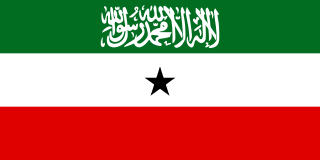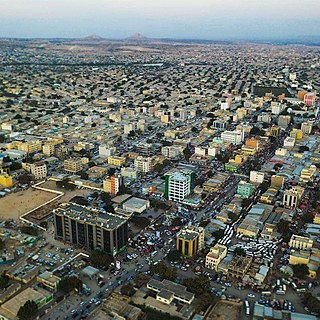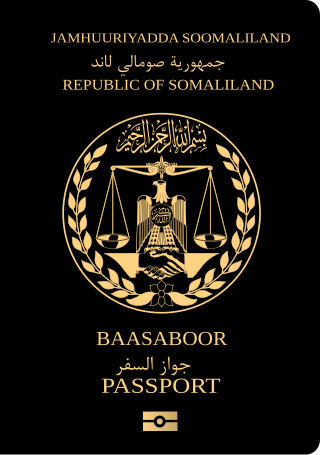 Blank Somaliland map | |
| Location | |
|---|---|
| Country | Somaliland |
| Continent | Africa |
| Access codes | |
| Country code | +252 |
| International access | 000, 000, 000 |
| Long-distance | 0 |
Telephone numbers in Somaliland use Somalia's country code, +252. [1]
 Blank Somaliland map | |
| Location | |
|---|---|
| Country | Somaliland |
| Continent | Africa |
| Access codes | |
| Country code | +252 |
| International access | 000, 000, 000 |
| Long-distance | 0 |
Telephone numbers in Somaliland use Somalia's country code, +252. [1]

Communications in Somalia encompasses the communications services and capacity of Somalia. Telecommunications, internet, radio, print, television and postal services in the nation are largely concentrated in the private sector. Several of the telecom firms have begun expanding their activities abroad. The federal government operates two official radio and television networks, which exist alongside a number of private and foreign stations. Print media in the country is also progressively giving way to news radio stations and online portals, as internet connectivity and access increases. In 2012, a National Communications Act was also approved by Cabinet members, and 2 October 2017, the president of Somalia Finally signed the National Communications Law, and became the official Law that regulated the ICT industry. Under that Law, National Communications Authority (NCA) of the federal Republic of Somalia has been established, with board of directors and a general manager. Somalia currently is ranked first in Africa for most affordable mobile data per gigabyte and 7th in the world.

Somaliland, officially the Republic of Somaliland, is an unrecognised country in the Horn of Africa, recognised internationally as de jure part of Somalia. It is located in the southern coast of the Gulf of Aden and bordered by Djibouti to the northwest, Ethiopia to the south and west, and Somalia to the east. Its claimed territory has an area of 176,120 square kilometres (68,000 sq mi), with approximately 6.2 million residents as of 2024. The capital and largest city is Hargeisa. The Government of Somaliland regards itself as the successor state to British Somaliland, which, as the briefly independent State of Somaliland, united from 1960 to 1991 with the Trust Territory of Somaliland to form the Somali Republic.
Subscriber trunk dialling (STD), also known as subscriber toll dialing, is a telephone numbering plan feature and telecommunications technology in the United Kingdom and various Commonwealth countries for the dialling of trunk calls by telephone subscribers without the assistance of switchboard operators.
A telephone numbering plan is a type of numbering scheme used in telecommunication to assign telephone numbers to subscriber telephones or other telephony endpoints. Telephone numbers are the addresses of participants in a telephone network, reachable by a system of destination code routing. Telephone numbering plans are defined in each of the administrative regions of the public switched telephone network (PSTN) and in private telephone networks.

.so is the internet country code top-level domain (ccTLD) for Somalia. After a long absence, the .so domain was officially relaunched on November 1, 2010, by .SO Registry, which is regulated by the nation's Ministry of Posts and Telecommunications. It was launched through various accredited registrars around the world.

The area code 868 is assigned to Trinidad and Tobago, a member of the North American Numbering Plan (NANP). The telephone numbering plan for the country is known as the National Numbering Plan. It is part of a system used for assigning telephone numbers in Trinidad and Tobago, and functions as a part of the North American Numbering Plan (NANP). It is regulated by the Telecommunications Authority of Trinidad and Tobago, which holds responsibility for telecommunications in the country.
Area code 246 is the telephone area code in the North American Numbering Plan (NANP) for Barbados. The sequence 246 spells BIM on an alpha-numeric telephone keypad, a nickname for the island.

The Economy of Somaliland largely relies on primary production and agriculture, where livestock is the main export of the country, which it ships to neighbouring Djibouti and Ethiopia, as well as to Gulf states, such as UAE, Saudi Arabia and Oman. Somaliland has a GDP per capita of $853 and a gross domestic product GDP of $2,583,000,000 as of 2024, most of which it receives in remittances from Somalis working abroad. The COVID-19 pandemic has restricted Somaliland's trade flows with decreased demand in the agriculture sector, a significant source of tax revenue.

The Somaliland National Armed Forces are the military services of the Republic of Somaliland. The Somaliland National Armed Forces consist of the Somaliland National Army, the Somaliland Coast Guard, the Somaliland Police Force, the Somaliland Custodial Corps, the Somaliland Immigration and Border Control and the Somaliland Fire Brigade. There is no air force. The Armed Forces is under the command of President Muse Bihi Abdi, who is the Commander-in-chief. Minister of Defence Abdiqani Mohamoud Aateye is the designated minister that oversees the armed forces.

Telecommunications in Somaliland, an internationally unrecognised republic claimed by Somalia, are mainly concentrated in the private sector. A number of local telecommunications firms operate in the region, including Golis Telecom Somalia, SomCable, Somtel and Telesom.

Telephone numbers in Europe are managed by the national telecommunications authorities of each country. Most country codes start with 3 and 4, but some countries that by the Copenhagen criteria are considered part of Europe have country codes starting on numbers most common outside of Europe.
Telephone numbers in Mexico are regulated by the Federal Telecommunications Institute, an independent government agency of Mexico. The agency published the Fundamental Technical Plan for Numbering on May 11, 2013. The plan establishes a uniform ten-digit telephone number format. It took effect on August 3, 2019.

The following outline is provided as an overview and topical guide to Somaliland:
Telephone numbers in Monaco are eight digits in length, with fixed line numbers beginning with the digit 9 and mobile phone numbers with the digit 6.

Telephone numbers in Vatican City are integrated into the Italian telephone numbering plan. The International Telecommunication Union (ITU) has assigned country code 379 to Vatican City, but it is not in use.

Before the civil war in 1991, very few people had access to the government-controlled fixed-line telephony that only operated in a few areas. Following the fall of the central government, the telecommunication industry fell into the hands of private investors and telephone numbering remained unregulated. Following its re-establishment in 2012, the Federal Government the government recognized the need to establish regulatory frameworks to ensure effective oversight and development of the telecommunication sector, and in 2017, the government enacted the National Communications Authority which is tasked to regulate and oversee the telecommunications industry.

The following is a survey of the postage stamps and postal history of Somalia. From the late 1800s to 1960, northwestern present-day Somalia was administered as British Somaliland, while the northeastern, central and southern part of the country were concurrently administered as Italian Somaliland. In 1960, the two territories were unified as the Somali Republic.
Capital punishment is a legal criminal penalty in Somalia, a nation in East Africa. Legally sanctioned executions of the death penalty in Somalia are carried out by shooting, in accordance with the 1962 Somali Penal Code and the Military Penal Code. Sharia and Islamic tribunals are recognised in Somalia in parallel with the civil law: these would have the authority to order execution by other means, such as beheading and stoning. Since at least the start of the 21st century, all executions by such methods have been applied ad-hoc, without official sanction, by non-state insurgent militias, in the context of an unstable government, and the ongoing civil war in the country. A number of these extrajudicial executions have violated sharia legal principles and appear to have a conflict-related tactical aim of inciting fear amongst civilians. Both officially sanctioned and extrajudicial executions by firing squad often occur in public.

The Somaliland passport is the passport issued to citizens of the unrecognized country of Somaliland for international travel. A passport was issued for the first time in 1996, and a biometric passport was in 2014, in line with new global standards and the requirements of the International Civil Aviation Organization.